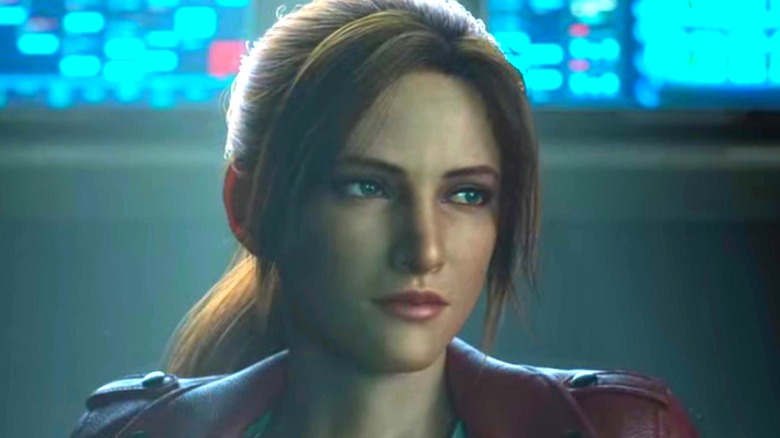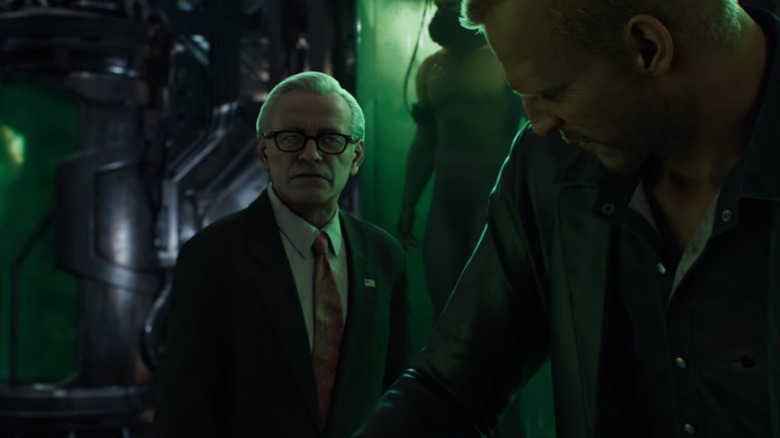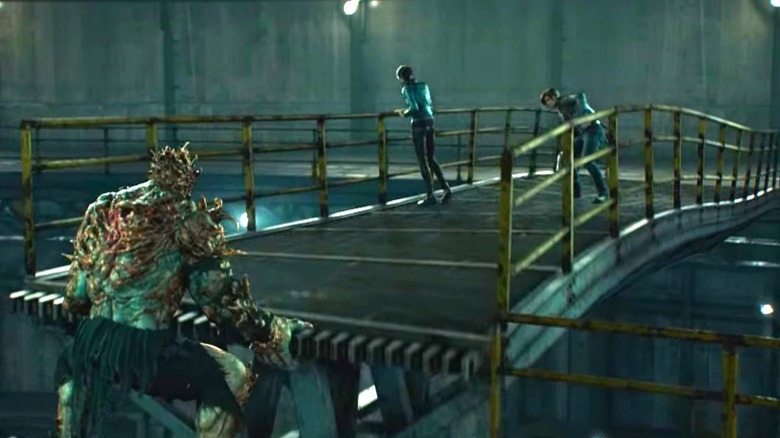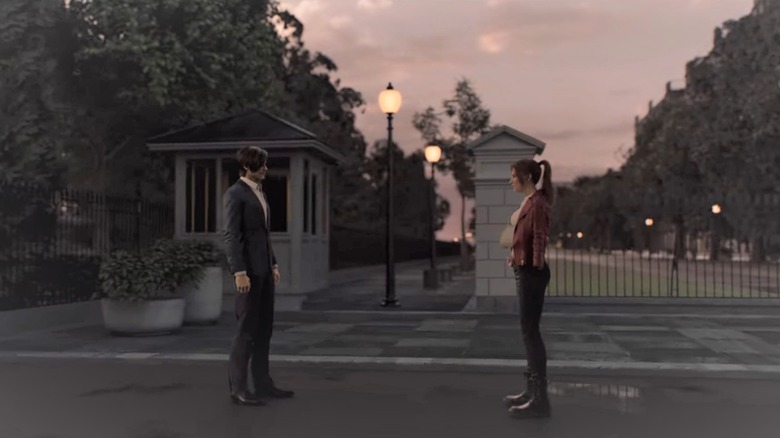The Ending Of Resident Evil: Infinite Darkness Season 1 Explained
Part sequel, part prequel, and part stand-alone tale in the rich tapestry that is the larger "Resident Evil" story, Season 1 of Netflix's anime series "Resident Evil: Infinite Darkness" checks a lot of boxes. The series itself takes place between the events of the games "Resident Evil 4" and "Resident Evil 5" and sees two beloved characters make their return. Not only does it give fans another story anchored by Leon Kennedy (Nick Apostolides) and Claire Redfield (Stephanie Panisello), it also makes some interesting connections to other narrative threads in the franchise.
After saving the daughter of US President Graham (Joe J. Thomas) in the events of "Resident Evil 4," Special Agent Leon Kennedy has found himself called on again following a hacking incident with serious national security implications. His new mission goes south almost instantly when a zombie outbreak sweeps through the White House. In the aftermath, Defense Secretary Wilson (Brad Venable) makes a bold proclamation. He believes the attacks are linked to a bioresearch facility in China, a revelation that could have major implications for relations between the two countries.
Meanwhile, on the other side of the world, Claire is working for an NGO in the fragile central-Asian country of Penamstan, which is recovering from a bloody civil war. The brutality of the human combatants is certainly horrifying but it pales in comparison to what Claire uncovers. In the midst of the fighting, there was a T-Virus outbreak, one that somebody is trying to cover up.
In the end, Leon and Claire's investigations collide as they realize they are pulling at opposite ends of the same rope. Here's how everything comes to a head at the end of "Resident Evil: Infinite Darkness."
Wilson was behind the attacks on the White House the whole time
When the twisted knot of a plot is finally unraveled, Leon learns that the Chinese government had nothing to do with the various attacks. It was, in fact, Secretary Wilson himself who orchestrated everything.
Wilson's scheme can be traced all the way back to the Penamstan Civil War and hinges on his investment in an inhibitor that dampens the effects of the T-Virus, meaning that subjects who are infected can experience the strength and endurance-boosting properties without fully mutating into zombies or other bioweapons. In trying to implicate China in the various attacks, Wilson was attempting to instigate a war. The US would be able to use Penamstan, which shares a border with China, as a base of operations. Meanwhile, Wilson's inhibitor-honed bioweapons would be deployed to great success and great profit. Once the virus spreads, civilians would also be clamoring to get their hands on the inhibitors to stave off fatal infection.
During much of the season, Leon worked with Jason (Ray Chase) and Shen May (Jona Xiao), two former soldiers who were stationed in Penamstan during the civil war. As it turns out, both of them were tangled up in Wilson's schemes long before the events of the series. Jason and his squad — the mysterious suicides of which Claire investigated — were infected with the virus during their time in Penamstan and Wilson has been extorting Jason into doing his bidding by threatening to withhold the lifesaving inhibitors from him.
While Leon believes his partners are helping him get to the bottom of the attack on the White House, Jason and Shen May have actually been working on their own plan to expose Wilson and wake the world up to what has actually been going on.
Unfortunately, nothing that noble is ever easy.
Jason reveals his own agenda
Like so many "Resident Evil" properties before it, the grand climax of "Infinite Darkness" takes place in a secret underground bioweapon storage facility. Wilson kidnaps Claire, who he hopes to extort into working with him. However, he's apprehended by Jason, who purposefully misses a dose of his inhibitor so that he can mutate into a giant bioweapon.
Jason incapacitates Wilson and kills Shen May before trying to escape from the facility. He hopes to crash a press conference being thrown by President Graham who, at the urging of Wilson, plans to give a speech implicating the Chinese Government in the White House security breach, an action that will no doubt lead to all-out war. In exposing his mutated self to the world, Jason hopes that he will instill within them enough terror so that they won't be able to look away from the actions of men like Wilson ever again.
"When they see me, then this world will know terror," he explains. Unfortunately for him, he never gets the chance. Leon and Claire team up to drop Jason into a vat of acid. Meanwhile, above ground, President Graham makes last-minute changes to his speech after an aide breaks the news that Wilson was behind the attacks, not China. President Graham is apprehensive at first, but when he's informed that the intel came from Leon, the man who recently saved his daughter's life, he's convinced.
There are major connections between Infinite Darkness and Resident Evil 5
While the story of "Infinite Darkness" does work as a contained narrative, it also has deeper implications for the franchise as a whole.
When Shen May fills Leon in on the schemes that have been going on behind the scenes, she specifically mentions that Wilson must be working with a larger pharmaceutical corporation. However, she doesn't know exactly which one. That question is answered for viewers at the very end of the season.
Wilson manages to escape being killed by Jason, but he was bitten and infected with the T-Virus. In one of the last scenes of the season, we see Wilson inject himself with one of the inhibitors that he takes out of a metallic briefcase with the logo of a company called Tricell printed on it.
Tricell is a pharmaceutical company that served as one of the main antagonists in "Resident Evil 5." A major plot point of that game is the discovery that Albert Wesker, a central villain who appears throughout the series, has not only infected himself with a bioweapon virus developed by Tricell but that he is also using an inhibitor similar to Wilson's to manage the effects.
While the revelation that Wilson was apparently working for Tricell while also operating within the US government doesn't exactly change the narrative of "Resident Evil 5," it's still a fascinating tie-in between the two stories.
Will Leon and Claire return for Resident Evil: Infinite Darkness Season 2?
One of the main draws "Infinite Darkness" has for longtime fans of the franchise is the chance to see Leon and Claire, the two protagonists of "Resident Evil 2," reunited for another adventure. The characters don't spend much time together during the series but the finale does give them a nice moment to re-establish their dynamic.
After they've foiled Wilson's plans, the two have a short moment together outside of the White House. Claire wants Leon to help her expose everything that has happened. But Leon is too close to President Graham and too dedicated to his work as a special agent to do that. As Claire walks away from the encounter, she looks at his suit and tells him, "that outfit doesn't suit you."
Even in their earliest video game iterations, Leon and Claire have always represented two opposing approaches to life. Leon was a rookie cop when we met him in "Resident Evil 2" and Claire a young biker. Although their experiences have given them a strong bond, Leon's fealty to authority and Claire's renegade spirit have always been at odds.
Will we see that dynamic at play in a possible Season 2 of "Infinite Darkness"? Considering how tightly wrapped up the story of Season 1 feels, it seems possible that if there is a second season, it might shift its focus to other characters, perhaps filling in a different time gap between two games in the mainline series.
In fact, another popular twosome from the franchise, Jill Valentine and Chris Redfield, also have a pre-"Resident Evil 5" story that has been touched on, but not fully explored. That's just one possibility for where this series could go should they choose to continue it.
At the time of writing, though, there's been no news on whether or not "Resident Evil: Infinite Darkness" will return. We still have that live-action Netflix series to look forward to, though.




